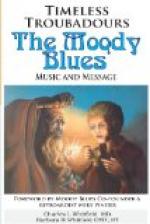Faitz es lo vers totz a randa,
Si que motz no y descapduelha.
outra la terra normanda
part la fera mar prionda;
e si.m suy de midons lunhans.
ves si.m tira cum diamans,
la belha cui dieus defenda.
Si.l reys engles el dux normans
o vol, ieu la veirai, abans
que l’iverns nos sobreprenda.
[48]
“The vers has been composed fully so
that not a word is wanting, beyond the Norman land
and the deep wild sea; and though I am far from my
lady, she attracts me like a magnet, the fair one whom
may God protect. If the English king and Norman
duke will, I shall see her before the winter surprise
us.”
How long Bernard remained in Normandy, we cannot conjecture. He is said to have gone to the court of Raimon V., Count of Toulouse, a well-known patron of the troubadours. On Raimon’s death in 1194, Bernard, who must himself have been growing old, retired to the abbey of Dalon in his native province of Limousin, where he died. He is perhaps more deeply inspired by the true spirit of lyric poetry than any other troubadour; he insists that love is the only source of song; poetry to be real, must be lived.
Non es meravelha s’ieu chan mielhs de nulh autre chantador; que plus mi tra.l cors ves amor e mielhs sui faitz a son coman.
“It is no wonder if I sing better than any other singer; for my heart draws me more than others towards love, and I am better made for his commandments.” Hence Bernard gave fuller expression than any other troubadour to the ennobling power of love, as the only source of real worth and nobility.
The subject speedily became exhausted, and ingenuity did but increase [49] the conventionality of its treatment. But in Bernard’s hands it retains its early freshness and sincerity. The description of the seasons of the year as impelling the troubadour to song was, or became, an entirely conventional and expected opening to a chanso; but in Bernard’s case these descriptions were marked by the observation and feeling of one who had a real love for the country and for nature, and the contrast or comparison between the season of the year and his own feelings is of real lyrical value. The opening with the description of the lark is famous—




